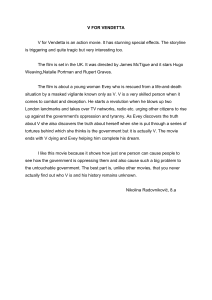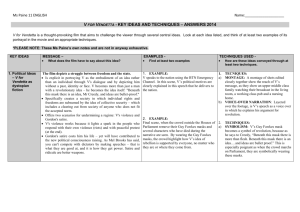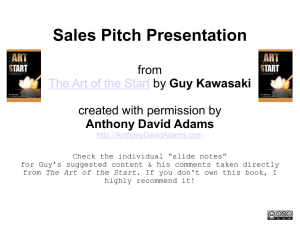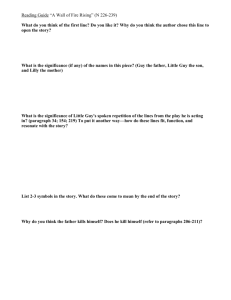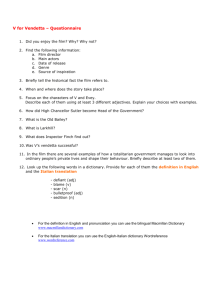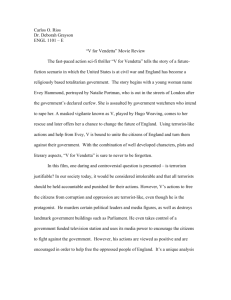ENG film V for Vendetta microsoft
advertisement
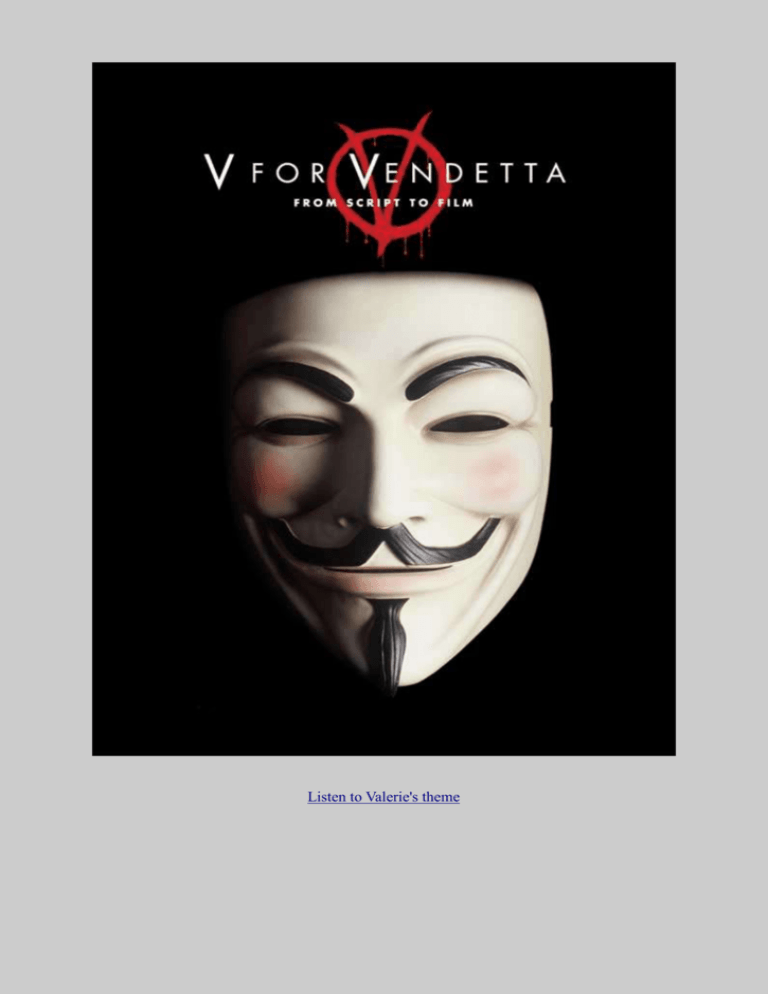
Listen to Valerie's theme Remember Remember the Fifth of November Remember, remember the fifth of November Gunpowder, treason and plot. I see no reason, why gunpowder treason Should ever be forgot. Guy Fawkes, guy, t'was his intent To blow up king and parliament. Three score barrels were laid below To prove old England's overthrow. By God's mercy he was catch'd With a darkened lantern and burning match. So, holler boys, holler boys, Let the bells ring. Holler boys, holler boys, God save the king. And what shall we do with him? Burn him! Remember, remember, the fifth of November, Gunpowder, treason and plot! A stick or a stake for King James' sake Will you please to give us a faggot If you can't give us one, we'll take two; The better for us and the worse for you! Guy Fawkes, Guy Stick him up on high, Hang him on a lamp post And there let him die. Guy,Guy,Guy, Poke Him in the eye, Put him on the fire And there let him die Burn his body from his head Then you'll say Guy Fawkes is dead Hip, Hip, Hooray! -Folkestone, Opie op.cit. p 281. Rumour, rumour, pump and derry, Prick his heart and burn his body, And send his soul to Purgatory. (Usually sung by children around the burning bonfire with the guy on top) Nursery Rhyme In England the 5th of November is still commemorated each year with fireworks and bonfires culminating with the burning of effigies of Guy Fawkes (the guy). The 'guys' are made by children by filling old clothes with crumpled newspapers to look like a man. Tradition allows British children to display their 'guys' to passers-by and asking for " A penny for the guy". History of the Gunpowder Plot & Guy Fawkes Night Four hundred years ago, in 1605, a man called Guy Fawkes and a group of plotters attempted to blow up the Houses of Parliament in London with barrels of gunpowder placed in the basement. They wanted to kill King James and the king’s leaders. Houses of Parliament, London Why did Guy Fawkes want to kill King James 1st and the king’s leaders? When Queen Elizabeth I took the throne of England she made some laws against the Roman Catholics. Guy Fawkes was one of a small group of Catholics who felt that the government was treating Roman Catholics unfairly. They hoped that King James 1st would change the laws, but he didn't. Catholics had to practise their religion in secret. There were even fines for people who didn't attend the Protestant church on Sunday or on holy days. James I passed more laws against the Catholics when he became king. What happened - the Gungpowder Plot A group of men led by Robert Catesby, plotted to kill King James and blow up the Houses of Parliament, the place where the laws that governed England were made. Guy Fawkes was one of a group of men i m a g e : b a r r e l The plot was simple - the next time Parliament was opened by King James l, they would blow up everyone there with gunpowder. The men bought a house next door to the parliament building. The house had a cellar which went under the parliament building. They planned to put gunpowder under the house and blow up parliament and the king. Guy Fawkes Discovered Guy Fawkes was given the job to keep watch over the barrels of gunpowder and to light the fuse. On the morning of 5th November, soldiers discovered Guy hidden in the cellar and arrested him. The trail of gunpowder at his feet would never be lit. Guy Fawkes was taken to the Tower of London He was tortured and questioned about the other plotters. To start with he didn't tell the soldiers anything about the plot. But, eventually he started to tell the truth. A Celebration In celebration of his survival, King James ordered that the people of England should have a great bonfire on the night on 5th November. The event is still commemorated annually in England on 5th November by fireworks and burning ‘guys’ (effigies) on bonfires. The searching of the cellars of Parliament before the opening of each new session, however, was not introduced until 1678. THE FILM “ V FOR VENDETTA” Guy Fawkes is central to “V for Vendetta”, which in origin was a comic book series that appeared in the 1980s, written by Alan Moore and illustrated mostly by David Lloyd. Though set in the future, it was meant to attack the then present premiership of Margaret Thatcher. The comic book was reworked into a film, with the film's original release scheduled for Friday, November 4, 2005 (a day before the 400th Guy Fawkes Night), but the release was delayed; it instead opened on March 17, 2006. Some believe it was postponed due to the July 7, 2005 London bombings, though producers denied this was the reason. The film was directed by James McTeigue and produced by Joel Silver and the Wachowski brothers (of The Matrix Trilogy fame), who also wrote the screenplay. The Wachowski brothers were fans of the comic book series and in the mid-1990s, before working on The Matrix, and wrote a draft screenplay that closely followed the graphic novel. Indeed, there are several parallels between V for Vendetta and the revolution that Morpheus tries to lead within the Matrix. Fawkes is V’s inspiration. “V” wants to change the course of history by blowing up the Houses of Parliament – he wants to succeed where Fawkes had failed, and the date for this attempt is of course November 5. As to why he wants to do so: he wants to destroy the authoritarian government. V is a freedom fighter who uses terrorist tactics in pursuit of a personal vendetta but, above all, he wants to force socio-political change in a dystopian Britain. In the 1980s, Moore had used the future to paint 1980s Britain, the film used the future to paint, as one reviewer, the paint a "world where politicians lied to get us into an unpopular war [Iraq], one where torture is no longer considered offlimits by people who are supposedly the good guys, and where public surveillance is all but ubiquitous.” The film has thus become notorious for one of its plethora of catchphrases: “People shouldn’t fear their governments; governments should fear their people.” PLOT So the story is set in ca. 2038, when Britain is ruled by a totalitarian regime called Norsefire . It follows Evey (pronounced “E-V”) Hammond, a young woman who, at the start of the film, is rescued from the state police by a masked vigilante, who introduces himself as V and then sets out his “mission statement”: “Voilà! In view, a humble vaudevillian veteran, cast vicariously as both victim and villain by the vicissitudes of fate. This visage, no mere veneer of vanity, is a vestige of the vox populi, now vacant, vanished. However, this valorous visitation of a bygone vexation stands vivified, and has vowed to vanquish these venal and virulent vermin vanguarding vice and vouchsafing the violently vicious and voracious violation of volition. The only verdict is vengeance; a vendetta held as a votive, not in vain, for the value and veracity of such shall one day vindicate the vigilant and the virtuous...” V takes Evey to a rooftop location to witness his spectacular first destruction: the Old Bailey, the “ouverture” to his year-long campaign. V has rigged the public address system, which is playing Tchaikovsky’s 1812 overture. The Old Bailey symbolises Justice and V feels it has to be destroyed, as Justice has taken a holiday and an impostor is ruling Britain. Of course, the regime explains the incident as a planned emergency demolition, with experts lined up to speak about a failed structural integrity of the building. The government claims that it was also blown up as evidence of Britain’s decadent past. But this is quickly shown to be a lie when V takes over the state-run television station (BTN) later that day. He walks into BTN as a suicide bomber, packed with explosives, and forces the station to play his prepared tape to the entire nation. V now informs the nation of his plan, urging the people of Britain to rise up and stand with him at the gates of Parliament on November 5, one year later. He implies that on that day he will destroy the Houses of Parliament. Though he is seen as a terrorist, V sees himself as a freedom fighter. He underlines that “the truth is that there is something terribly wrong with this country”. There is no freedom to object. The government is coercing your conformity. Who is to blame? Who is held accountable? Not the government, but the guilty, “us”. How did it get like this? “We were afraid. War. Terror. Disease, robbed us of common sense. Fear. And we turned to the Chancellor who promised peace, and to give us silent obedient consent.” Afraid of terror, we have allowed a terrific monster to be created: a totalitarian government, which hopes the nation will suffer from a collective form of amnesia. V wants to remind us of our past. “This country has forgotten something. Fairness. Justice. Freedom. They are more than words. They are perspectives. Stand beside me, one year from tonight, and together we will give them a fifth of November that shall never, ever, be forgotten.” He has laid down his challenge – and his agenda. Within V’s liberation agenda, Fate then throws Evey, who works at the BTN and who the authorities believe is V’s comrade-in-arms, in the role of his accomplice. As Fate would have it, her parents were considered to be terrorists too. For the police, it is clear why she is doing it; as to V, and who he is, that is a major mystery. They are unable to comprehend that V is a human being; they depict him as if he has no human emotions. Still, “part of him is human”. It underlines how at the first, the police are totally unable to comprehend what motivates V; they see a man who breaks the law and nothing more. The police also search for a connection between V and Evey, but there is none. As to why V does what he does, this is only a slow realisation that the police make as his campaign progresses, before finally discovering that they should indeed be on his side. Meanwhile, BTN News makes it look as if the terrorist V was killed in a “heroic” raid that ended V’s siege of the BTN Tower – in reality, V escapes, and takes Evey with him. This episode also refers to one major difference between book and film: the computer system "Fate" is completely missing from the film. Fate was a Big-Brother-like computer which served as Norsefire's eyes and ears and also helped explain how V could see and hear the things he did. Of course, Fate’s presence would have made V for Vendetta very much into a Matrix clone. Instead, there are subtle references to the role of Fate (as in coincidence), with V indicating on numerous occasions that there is no such thing as coincidence, but merely the illusion of coincidence – suggesting an underlying plan – a greater scheme, hinting that V’s personal vendetta is not so much personal, but that perhaps he sees himself acting out a divine retribution, a notion not uncommon in terrorist – or government – propaganda. Though Evey becomes V’s comrade-in-arms by Fate, we also see how V is not alone in wanting change. Evey finds rescue in the home of one of her superiors from the BTN, Gordon Deitrich (Stephen Fry), who reveals to her that he is a closet homosexual and a collector of banned art and literature. He has a copy of the Koran. He is not a Muslim (which, it is implied, has become outlawed), but he finds the book moving and interesting. Homosexuals too are outlawed. Though well-known and in the public eye, no-one knows him really. “You wear a mask for so long, you forget who you are beneath it.” This of course also applies to V. V is also a collector of art. Some of the works of art displayed in V’s gallery include "The Arnolfini Portrait" by Jan van Eyck, "Bacchus and Ariadne" by Titian, a Mildred Pierce poster, "St. Sebastian" by Andrea Mantegna and "The Lady of Shalott" by John William Waterhouse. V explains that “artists tell lies to tell the truth, while politicians use them to cover the truth up.” And it is clear that both the comic book and the film are artistic expressions. His personal motto is "VI VERI VENIVERSUM VIVUS VICI", "By the power of Truth, I, while living, have conquered the universe", taken from Faust, another “dramatis persona” upon which V seems to have based himself. He explains that symbols are important, as they are given power by the people, whether it is the Houses of Parliament, the Old Bailey… or Guy Fawkes. Still, V hiding behind a symbolic mask is used by the government to make ridicule of him: “A man does not wear a mask. A man does not threaten innocent civilians. He is a coward.” The year-long campaign that V has set out is a killing spree, a personal vendetta, whereby each murder has to be explained away by the authorities, but whereby each murder helps the police paint the truth: that V is doing this spree as it is his personal vendetta. One by one, leading social figures are killed; there is the murder of a paedophile bishop. There is Lewis Prothero, the “Voice of London”, who “died in his sleep”, rather than in the shower, where V kills him. As the killing spree continues, the trail becomes clear, and involves another V: Viadoxic Pharmaceuticals. It operated a site known as Larkhill, where fourteen years earlier, the company had made a discovery that “could be the dawn of a new age”. The facility is described as the end of atomic, but the start of biological warfare. What no-one knows, is that the agents are tested on humans, which the scientists involved describe as “weak and pathetic” people, “helping” their country. This is where V’s role comes to the forefront. One night, one November 5, the facility was hit by a series of explosions. It turns out that only one person survived: V. He stayed in room 5 – V – and not only is he the sole survivor, it also seems that he was the person who created the explosions, a skill he has also used on the Old Bailey and will use on the Houses of Parliament. But that is not all: the leaders of Viadoxic were also the ones who created the totalitarian regime. The ultra-conservative Norsefire party played upon the deeply divided country, trying to gain in power, until a bioterrorist attack occurred, killing 80,000 people. The fear generated by the attack allowed Norsefire to silence all opposition and win the next election by a landslide. A cure for the virus was discovered soon afterwards. But rather than return to a state of peace and freedom, fear was used to turn Britain into a bigoted totalitarian order, with their leader Adam Sutler becoming the High Chancellor. The entire nation, fourteen years onwards, still lives under the notion that it was a biological attack by a terrorist, but V knows better. The question he poses is what if the worst most horrific biological attack was not the work of religious extremists? (Who were, by the way, executed for it.) What if someone else unleashed the virus and someone else killed all of these people? He asks “Would you really want to know who it was? If it was someone working for this government? If our own government was responsible for the deaths of almost 100,000 people. Would you really want to know?” The police figure out V’s motive just before the murder of a doctor who was involved in the Viadoxic experiments and who apologises for what they did to V, but V remarks that “I have not come for what you hoped to do, I have come for what you did.” Though the doctor wanted to do differently, she did it just the same. Only the top echelon of the party, all guilty of the crimes committed against V and the loss of freedom in Britain, now survive. They are trying to stop the police’s Larkhill investigation, by questioning the loyalty of the investigating chief inspector: the contents of the documents are made subject to national security and at the same time put in doubt. They are described as a possible forgery created by the terrorist himself, or a delusion of the writer. Either way, it would be an act of treason if their contents were divulged. “You would do well, inspector, to put it out of your mind.” A key sequence is when Evey thinks that she is captured by the police, incarcerated and tortured for days, finding solace only in the notes left by another prisoner named Valerie, who was imprisoned and persecuted for being a lesbian. Evey is told that she will be executed unless she reveals V's whereabouts. An exhausted Evey finally says she would rather die, and, surprisingly, is then released. Evey discovers that she has been in V's lair all along, and that her imprisonment was staged by V. By forcing Evey to experience what he had gone through long ago, V hoped that Evey would understand that our integrity, "the very last inch of us", can be more important than our lives. She is now rid of fear, not afraid of dying; she is truly liberated; she has, like V, become “superhuman”. At this point, V reveals that Valerie was the spark of his rebellion and hatred of the government. V tells her that she hates him now for what he has done to her, but “then something happened, it happened to me, just like it happened to you.” V created a lie, but because she believed it, she found something true about herself. “This is the most important moment of your life. Commit to it.” It is here that there is a graphic representation of her rebirth: she receives a baptism of water (rain), interspersed with flashbacks to V's rebirth, when a victim in a cruel pharmaceutical experiment liberated himself, and via a baptism of fire, was reborn as V, heralding a twenty year long vendetta, which is supposed to lead to a new world. As November 5 nears, V's various schemes cause chaos and the population grows more and more intolerant and subversive towards the regime. The TV pumps up fear, to underline that obedience is required against the danger that is everywhere. There are references to civil war in the United States; water shortage and water coupons; avian flu; quarantaine zones and airborne pathogen, while the terrorist V is linked with an attack on London 14 years ago. The government is trying to maintain the status quo of fear and showing that revolt will lead to severe consequences. On the eve of November 5, Evey is shown a train in an abandoned London Underground station which V has filled with explosives in order to destroy Parliament. He leaves the decision up to her and leaves to meet Party leader Creedy who, as part of an earlier agreement, has agreed to bring the Chancellor to V in exchange for V's surrender. Creedy kills the Chancellor in front of V, but rather than surrender, V also kills Creedy. During the fight, Creedy asks: “Why won’t you die?” “Beneath this mask is an idea. And ideas are bullet proof.” V the man, however, is mortally wounded in the fight, but returns to Evey, thanks her, professes his love for her, and dies. His body is placed upon the train with the explosives, his funeral barge, which Evey, with the consent of the chief inspector, sends towards the Houses of Parliament. Meanwhile, thousands of Londoners, all wearing Guy Fawkes’ masks, march on Parliament to watch the event. Because Creedy and the Chancellor are dead, the military receives no orders from superiors and, as a result, stands down in the face of these riots, preventing bloodshed. Remarkably, the final scene, incorporating Westminster, the area from Trafalgar Square and Whitehall up to Parliament and Big Ben, was actually shot on location. The area had to be closed for three nights. This was the first time the security-sensitive area (home to 10 Downing Street and the Ministry of Defence) had ever been closed to accommodate filming. Furthermore, Prime Minister Tony Blair's son Euan worked on the film's production and is said (through an interview with Stephen Fry) to have helped the filmmakers obtain the unparalleled filming access. This drew criticism for Blair from Conservative MP David Davis due to the controversial content of the film. However, the makers of the film denied Euan Blair's involvement in the deal, stating that access was acquired through nine months of negotiations with 14 different government departments and agencies. The Houses of Parliament is destroyed by the explosion amid the 1812 Overture. On a nearby rooftop, Evey and chief inspector Finch watch the scene together and hope for a better tomorrow – a real hope, not like the one that would turn an atomic into a biological war. Earlier, V illustrated that Victory was a perilous event, for it would be a domino-effect, illustrated by V playing with dominoes, in which one action leads to a next step, each increasing the former, until a crescendo is reached and the final domino does or does not fall… But in the end, the reVolution was successful. V is dead; his vendetta has wiped the slate clean; a new world will dawn tomorrow, a new Britain can be built. V is now no longer for Vendetta, but for Victory. But in the end, V is also for loVe; though V’s actions will have major political consequences, in the end, he was also a man, and his motives were not purely for the greater cause, but also because he had suffered as a man. “A man can be killed and forgotten, but 400 years later, an idea can still change the world. […] Ideas do not bleed. They do not feel pain. They do not want love. But it is not an idea I miss. It is a man.” V. (adapted from P. Coppens, Conspiracy Times) Here are some of the most important scenes from the film. V'S REVOLUTIONARY SPEECH ON TV people should not be afraid of their governments Valerie's story the man from room five coup de theatre: Evey's awakening imagine a virus... Finch's revelation the last dance Revolution QUOTES Good evening, London. Allow me first to apologize for this interruption. I do, like many of you, appreciate the comforts of every day routine- the security of the familiar, the tranquillity of repetition. I enjoy them as much as any bloke. But in the spirit of commemoration, thereby those important events of the past usually associated with someone's death or the end of some awful bloody struggle, a celebration of a nice holiday, I thought we could mark this November the 5th, a day that is sadly no longer remembered, by taking some time out of our daily lives to sit down and have a little chat. There are of course those who do not want us to speak. I suspect even now, orders are being shouted into telephones, and men with guns will soon be on their way. Why? Because while the truncheon may be used in lieu of conversation, words will always retain their power. Words offer the means to meaning, and for those who will listen, the enunciation of truth. And the truth is, there is something terribly wrong with this country, isn't there? Cruelty and injustice, intolerance and oppression. And where once you had the freedom to object, to think and speak as you saw fit, you now have censors and systems of surveillance coercing your conformity and soliciting your submission. How did this happen? Who's to blame? Well certainly there are those more responsible than others, and they will be held accountable, but again truth be told, if you're looking for the guilty, you need only look into a mirror. I know why you did it. I know you were afraid. Who wouldn't be? War, terror, disease. There were a myriad of problems which conspired to corrupt your reason and rob you of your common sense. Fear got the best of you, and in your panic you turned to the now high chancellor, Adam Sutler. He promised you order, he promised you peace, and all he demanded in return was your silent, obedient consent. Last night I sought to end that silence. Last night I destroyed the Old Bailey, to remind this country of what it has forgotten. More than four hundred years ago a great citizen wished to embed the fifth of November forever in our memory. His hope was to remind the world that fairness, justice, and freedom are more than words, they are perspectives. So if you've seen nothing, if the crimes of this government remain unknown to you then I would suggest you allow the fifth of November to pass unmarked. But if you see what I see, if you feel as I feel, and if you would seek as I seek, then I ask you to stand beside me one year from tonight, outside the gates of Parliament, and together we shall give them a fifth of November that shall never, ever be forgot. Read this article published in The Guardian last year There's just one more speech worth listening to, if you can spare four minutes... Watch it
